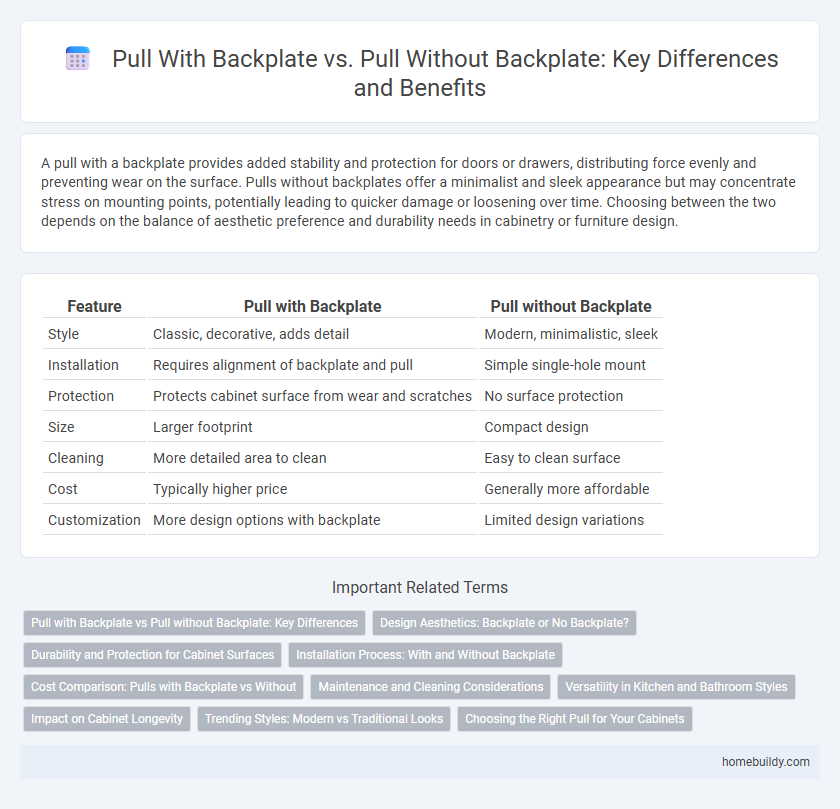A pull with a backplate provides added stability and protection for doors or drawers, distributing force evenly and preventing wear on the surface. Pulls without backplates offer a minimalist and sleek appearance but may concentrate stress on mounting points, potentially leading to quicker damage or loosening over time. Choosing between the two depends on the balance of aesthetic preference and durability needs in cabinetry or furniture design.
Table of Comparison
| Feature | Pull with Backplate | Pull without Backplate |
|---|---|---|
| Style | Classic, decorative, adds detail | Modern, minimalistic, sleek |
| Installation | Requires alignment of backplate and pull | Simple single-hole mount |
| Protection | Protects cabinet surface from wear and scratches | No surface protection |
| Size | Larger footprint | Compact design |
| Cleaning | More detailed area to clean | Easy to clean surface |
| Cost | Typically higher price | Generally more affordable |
| Customization | More design options with backplate | Limited design variations |
Pull with Backplate vs Pull without Backplate: Key Differences
Pulls with backplates provide added protection to cabinet surfaces, preventing wear and damage around the handle area, while pulls without backplates expose the cabinet face to direct contact. Backplates often add a decorative element, enhancing the overall aesthetic and creating a more substantial look compared to the minimalist style of pulls without backplates. Installation with backplates can cover existing holes or imperfections, making them ideal for cabinet upgrades, whereas pulls without backplates require precise drilling aligned with the handle's mounting holes.
Design Aesthetics: Backplate or No Backplate?
Cabinet pulls with backplates create a layered visual appeal, adding depth and a classic or traditional aesthetic to cabinetry. Pulls without backplates offer a sleek, minimalist look that highlights clean lines and modern design sensibilities. Choosing between the two depends on whether the focus is on decorative detail or streamlined simplicity in kitchen or furniture hardware.
Durability and Protection for Cabinet Surfaces
Cabinet pulls with backplates offer enhanced durability by distributing force more evenly across the surface, reducing wear and preventing damage to cabinet finishes. Backplates also provide additional protection against scratches and dents from frequent use, extending the lifespan of cabinet surfaces. Pulls without backplates concentrate stress at mounting points, which can lead to quicker surface deterioration and less overall protection for cabinetry.
Installation Process: With and Without Backplate
Cabinet pulls with backplates simplify installation by providing a larger surface area for mounting, ensuring alignment and covering existing holes from previous hardware. Pulls without backplates require precise measurement and drilling directly into the cabinet, demanding greater accuracy to avoid misalignment or damage. The backplate option reduces installation time and corrects imperfections, while pulls without backplates offer a cleaner, minimalist aesthetic but require more careful handling during installation.
Cost Comparison: Pulls with Backplate vs Without
Cabinet pulls with backplates generally cost more due to additional materials and manufacturing complexity compared to pulls without backplates. The backplate adds extra weight and design detail, increasing production expenses and retail prices. Choosing pulls without backplates can reduce overall hardware costs while offering a sleeker, minimalist look for cabinetry.
Maintenance and Cleaning Considerations
Cabinet pulls with backplates offer easier cleaning since the flat surface prevents dirt and grime from accumulating behind the handle, reducing maintenance time. Pulls without backplates can trap dust and grease around the mounting area, requiring more frequent and detailed cleaning to maintain hygiene. Choosing pulls with backplates enhances durability by protecting the cabinet surface from wear and staining caused by regular use and cleaning.
Versatility in Kitchen and Bathroom Styles
Cabinet pulls with backplates offer versatile design options that complement both traditional and transitional kitchen and bathroom styles, providing a layered aesthetic and protecting cabinetry surfaces. Pulls without backplates suit sleek, modern, and minimalist designs by delivering a clean, unobtrusive look that highlights cabinetry lines. Selecting between pulls with or without backplates depends on desired style coherence and functional needs within kitchen and bathroom spaces.
Impact on Cabinet Longevity
Cabinet pulls with backplates distribute stress more evenly across the cabinet surface, reducing wear and tear around the mounting area and enhancing cabinet longevity. Pulls without backplates concentrate force on smaller areas, increasing the risk of surface damage and loosening over time. Choosing backplate pulls minimizes structural damage and maintains the integrity of the cabinet, ensuring a longer lifespan.
Trending Styles: Modern vs Traditional Looks
Cabinet pulls with backplates are trending in traditional and transitional styles, offering a classic, detailed look that enhances vintage or rustic cabinetry with added depth and protection. Pulls without backplates are favored in modern and minimalist designs, emphasizing clean lines and simplicity for a sleek, unobtrusive appearance. Both styles influence the kitchen's overall aesthetic, with backplates providing a decorative element and protection, while without backplates focus on streamlined functionality.
Choosing the Right Pull for Your Cabinets
Selecting the right cabinet pull involves understanding the functional and aesthetic differences between pulls with backplates and those without. Pulls with backplates provide extra protection to the cabinet surface, hide imperfections, and add a decorative element, making them ideal for traditional or rustic styles. Pulls without backplates offer a minimalist, sleek look suited for modern or contemporary cabinets, allowing easier customization and smaller installation footprints.
pull with backplate vs pull without backplate Infographic

 homebuildy.com
homebuildy.com